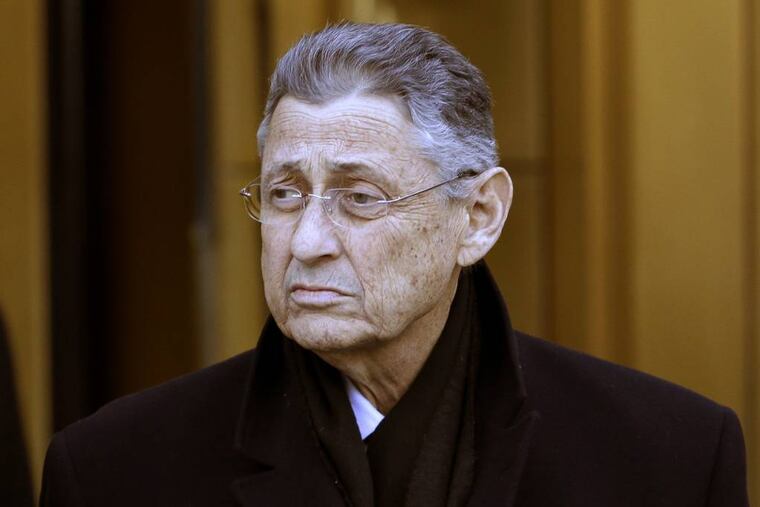Money for nothing
Federal authorities recently charged former New York Assembly Speaker Sheldon Silver with collecting kickbacks disguised as "referral fees." This will have a familiar ring to many Pennsylvanians, and not just the part about a power broker taking a perp walk. Referral fees were also part of the disciplinary investigation of Seamus McCaffery, who left the commonwealth's highest court under pressure last year.

Federal authorities recently charged former New York Assembly Speaker Sheldon Silver with collecting kickbacks disguised as "referral fees." This will have a familiar ring to many Pennsylvanians, and not just the part about a power broker taking a perp walk. Referral fees were also part of the disciplinary investigation of Seamus McCaffery, who left the commonwealth's highest court under pressure last year.
It's no coincidence that referral fees, which lawyers pay to other lawyers who send them cases, have come up more than once in ethically questionable (albeit factually distinct) contexts. The at best loose correlation of fees with actual work, along with the rich population of lawyers doubling as ostensible public servants, makes the payments a potential currency for a wide range of intangibles and unnameables.
The McCaffery mess should move the remaining Supreme Court justices to revisit the state's limp rules on these fees. At the very least, the state's ethical standards for lawyers should be brought into line with the national standards by which most states abide. In fact, the scandal that just roiled the highest ranks of the judiciary warrants going further in restricting referral fees or banning them outright.
The American Bar Association's model rules require that lawyers receiving referral fees perform a proportionate amount of work or take joint responsibility for the cases in question. The model rules also require that such fees be disclosed to and approved by clients in writing, including the share each lawyer receives. Most states have adopted or gone beyond these reasonable restrictions.
Pennsylvania, however, is among a minority of states that are much more permissive. Its rules require only that clients be advised of and not object to referral fees, while the share each lawyer receives need not be disclosed. Nor does the state require lawyers receiving fees to perform any work or assume any responsibility.
The McCaffery case illustrates the pitfalls of this freewheeling approach. The former justice's wife, Lise Rapaport, collected more than $1 million in referral fees in her capacity as an attorney while serving as McCaffery's top judicial aide. A closer look by The Inquirer this week showed how little some clients knew about these arrangements or the referring attorney; indeed, there was plenty of confusion about whether a case was referred by Rapaport or McCaffery himself.
Moreover, because Pennsylvania's rules prohibit judges from practicing law and restrict outside legal work by their staffs, Rapaport's referral fees depended partly on her ability to claim that they involved no work. Such fees are prohibited by definition in most states. Pennsylvania should join them.